This verse indicates that believers should only befriend believers, the obedient, and those who have good character. Being with such people protects the believers from all kinds of danger, prevents them from going astray, and helps them to do right actions. Since the believers are one another's friends and guardians, they will remind each other of Allah's Signs and recommend good morals. Befriending people who lead others astray and provoke rebellion brings nothing but loss and disaster, as the verse below states:
When Satan made their actions appear good to them, saying: "No one will overcome you today, for I am at your side." But when the two parties came in sight of one another, he turned right around on his heels, saying: "I wash my hands of you. I see what you do not see. I fear Allah. Allah is severe in retribution." (Surat al-Anfal, 48)
Do not forget that in this world, Satan appears to people as their friend. But when he comes face to face with Allah's punishment, he deserts those who befriended him. For this reason, the Qur'an always commands believers to choose other believers as friends and protectors, as in:
Your friend is only Allah, His Messenger, and those who believe: those who establish prayer, give alms, and bow [in prayer]. As for those who make Allah their friend, and His Messenger and those who believe: it is the party of Allah who are victorious! (Surat al-Ma'ida, 55-56)
These verses reveal that those who ascribe partners to Allah will find an unexpected recompense in the Hereafter: Their partners will desert them on that day, and so they will find themselves all alone. Everyone will be accountable only for his or her own actions, and no one will be wronged. The Qur'an says:
If even a single waft of the punishment were to touch them, they would exclaim: "Alas for us! We were indeed wrongdoers." We will set up the Just Balance on the Day of Rising, and no self will be wronged in any way. Even if it is no more than the weight of a grain of mustard-seed, We will produce it. We are sufficient as a Reckoner. (Surat al-Anbiya', 46-47)
These verses also relate that those who ascribed partners to Allah will search for a "way of escaping," but that a way out will never be found. Their situation is known to Allah. The revelations given in this verse are not known to anyone, the described scene has not been seen by anyone, and the conversations have not been heard by anyone. Thus, these future events are part of the Unseen, which means that they are part of the future, which we cannot know. But in the sight of Allah, Who encompasses all times, these events have already taken place and ended.
| 1. PAST, 2. PRESENT, 3. FUTURE |
Our Lord knows people's excuses, their escape plans, the methods they use, how they will be punished, and how they will suffer for eternity, for He is the One Who created everything. He reveals this to us beforehand so that we can learn from others' mistakes. However, only humanity has a concept of "beforehand." In Allah's presence, "before" and "after" do not exist, for both are in His presence right now. In other words, Allah does not "remember" the past or "wait to know" the future; rather, He "knows" both of them, but His knowing is not like our knowing. Things that are yet to happen are known in Allah's guidance (hifz), but this knowledge is not like we learn something. The "after" is right now and also finished now, it has happened and it is finished. Every moment, past, present and future, everything we live exists with Allah as "one moment." Allah encompasses all time and space with his knowledge.
| They will exclaim: "Alas for us! Who has raised us from our resting-place? This is what the All-Merciful promised us. The Messengers were telling the truth." (Surah Ya Sin: 52) | ||
The Qur'an guides people to faith and separates truth from falsehood It is a gift from Allah, clear and intelligible, a reminder and an admonishment. The above verse makes clear that the the Qur'an contains many examples and explanations on a variety of subjects to meet the needs of all people while they exist in this world. From morals to everyday matters, from interpersonal relations to commerce, from the signs of creation in the heavens and the Earth to the signs about the future, they are all to be found in the Qur'an. For example, those wishing to live the religious morality are told: "… We have not omitted anything from the Book…" (Surat al-An`am, 38). This quality is revealed in the following verses:
"Am I to desire someone other than Allah as a judge, when it is He Who has sent down the Book to you clarifying everything?" Those to whom We have given the Book know that it has been sent down from your Lord with truth, so on no account be among the doubters. The words of your Lord are perfect in truthfulness and justice. No one can change His words. He is the All-Hearing, the All-Knowing. (Surat al-An`am, 114-115)
… We have sent down the Book to you, making all things clear, and as guidance and mercy and good news for the Muslims. (Surat an-Nahl, 89)
 Allah'ın Kuran'da men ettiği tartışmacı karakter hem insanın kendisini sıkıntıya sokan hem de çevresindeki insanların rahatsızlık duymasına yol açan bir tavır bozukluğudur. Tartışmaların çözümü ise Kuran'da "sözün en güzelini söylemek" olarak tavsiye edilmiştir. |
One of the great benefits of the Qur'an being revealed as such an enlightening book is that people can find in its verses the solutions to their shortcomings and advice on what to do in moments of anger, how to be patient in difficult circumstances, and how to refrain from those qualities (e.g., envy and mocking) that lead away from good character. Furthermore, it informs the believers about the hypocrites, those who associate others with Allah, the unbelievers' character, and how to draw lessons from their situation. Therefore, those who ponder its verses can learn many things about one's self and what is happening around them. As Allah says:
In this way We have sent it down as an Arabic Qur'an, and have diversified therein the warnings so that hopefully they will avoid sin or that it will spur them to remembrance. (Surah Ta Ha, 113)
Surat al-Kahf 54 also points out humanity's argumentative nature. Many people are conceited, consider their views to be superior to those of others, and, because they do not respect their opponents' thoughts, argue and try to win the ensuing battle of words. They do everything in order to convince the others: they get angry, shout, and even become aggressive.
On the other hand, believers respond to such argumentative behavior by judging the matter with the Qur'an and speaking in the nicest manner. They know that this is the only effective way to call others to the righteous path and, with Allah's help, to always be successful. The effect of such behavior is described, as follows:
A good action and a bad action are not the same. Repel the bad with something better and, if there is enmity between you and someone else, he will be like a bosom friend. (Surah Fussilat, 34)
Here we are presented with the situation of those people who persisted in their unbelief even after being invited to the Qur'an's morality and advised by the Messengers to follow the righteous path. Overcome by their conceit, they would not repent and ask for forgiveness. Rather, they were waiting for Allah to send a disaster. This suggests that they considered it highly unlikely that Allah would send a disaster, that they had little fear, or even no fear, of Allah.
When the Messengers whom Allah had sent to earlier nations invited their people to faith and to live by religion's morality, they encountered similar forms of denial and rejection. Every nation that did not fear Allah persisted in its denial, and thus its people inevitably merited punishment. The Qur'an reveals that Allah's eternal law prescribes punishment for those who persist in their unbelief. Some of these verses are given below:
Say to those who do not believe that if they stop, they will be forgiven what is past; but if they return to it, they have the pattern of previous peoples in the past. (Surat al-Anfal, 38)
Shown by their arrogance in the land and evil plotting. But evil plotting envelops only those who do it. Then do they await anything except the pattern of the former peoples? You will not find any changing in the pattern of Allah. You will not find any alteration in the pattern of Allah. (Surah Fatir, 43)
But when they saw Our violent force, their faith was of no use to them. That is the pattern that Allah has always followed with His servants. Then and there, the unbelievers were lost. (Surah Ghafir, 85)
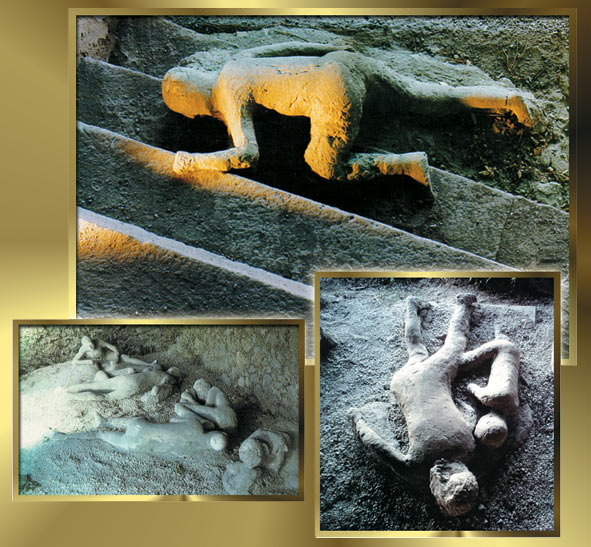
According to Allah's eternal law, which is absolute and unchanging, all nations that did not accept the Messengers' invitation were destroyed at a time of His determination. Nobody can alter, bring forward, or delay it even by one hour, because our Lord, the Governor of all, determined this in eternity. One verse says:
This is Allah's pattern with those who passed away before. You will not find any alteration in Allah's pattern. (Surat al-Ahzab, 62)
We are informed in the Qur'an that Allah has sent Messengers to every nation to spread His religion and to destroy the entrenched systems of unbelief. They have invited the unbelievers in a variety of ways to believe in Allah and abide by Islam's morals. But throughout history, false beliefs have been deeply rooted in society, and people have vehemently opposed the true religion, defended false beliefs, strenuously promoted irreligion and immorality and flagrantly tried to oppress others. They worked to destroy the positive influence of Allah's Messengers over the people and to prevent the people from abiding by religion's morality.
Societies based upon unbelief tried a variety of methods to prevent the truth: slandering the Messengers to curb their influence and trying to plot against the Prophets, objecting to the Messengers as well as the Books of revelation that they brought, trying to stop people from reading them, and resorting to violence when they deemed it necessary. For instance, the following verse relates the struggle of Nuh's (as) nation to stop him, as follows:
The people of Nuh denied the truth before them and the confederates after them. Every nation planned to seize its Messenger, and used false arguments to rebut the truth. So I seized them, and how [terrible] was My retribution! (Surah Ghafir, 5)
As Allah says in the above verse, the unbelievers' struggle is an evil one that will end in ultimate loss. Allah has never allowed them to succeed in the past, and will not allow them to do so in the future. At a time of His determination, our Lord will severely punish those who try to lead people astray from the true religion, for He has written this in their destiny. Those who go astray and deny the truth suffer a great loss now and an even greater disaster in the Hereafter, as Allah says:
The kingdom of the heavens and Earth belongs to Allah, and on the Day that the Hour arrives, [on] that Day the liars will be lost. (Surat al-Jathiyya, 27)
Surat al-Kahf 56 also relates that the unbelievers mocked Allah's Signs (i.e. verses), and the approaching punishment in Hell.
One of the greatest reasons for their denial of Allah's verses is their conceit. What they desire most is that no one pronounce Allah's name or take an interest in Islam's morality, because only in such an environment will they be able to continue with their vile character and feel at ease. They think that they can find peace if they deny the evidence for creation or blatantly ignore Allah's power. Such willful ignorance means that even the most clear-cut evidence will never convince them to believe. By denying Allah and religion, they think that they will gain the upper hand and status with the people around them who, like all other living beings, were created by Allah and so are completely dependent upon Him and totally helpless without Him.
Their vanity is founded on the gifts that Allah gave them: intelligence, physical strength, material means, good looks, and whatever else they have. But those people who cannot use their intellect and conscience choose to mock, rather than to be grateful.
The Qur'an states that such people begin to mock Allah's verses the moment they hear them. For instance: "Each time a sura is sent down, there are some among them who say: 'Which of you has this increased in faith?' As for those who believe, it increases them in faith and they rejoice at it (Surat at-Tawba, 124). And yet their mocking does not demoralize or discourage the believers; rather, it only increases their motivation and devotion. In another verse, the unbelievers' lack of understanding and warped attitude toward the verses is described, as follows:
Allah is not ashamed to make an example of a mosquito or of an even smaller thing. As for those who believe, they know it is the truth from their Lord. But as for those who do not believe, they say: "What does Allah mean by this example?" He misguides many by it, and guides many by it. But He only misguides the deviators. (Surat al-Baqara, 26)
As the above verse says, the unbelievers did not understand Allah's purpose behind making an example of the mosquito in one of His verses. Due to their ignorance, they asked "What does Allah mean by this example?" and mocked the verse. But today, science has discovered that the much-maligned mosquito has many miraculous qualities.
Allah pointed at this creature's miraculous qualities 1,400 years ago, and the unbelievers of that time, because they lacked this knowledge, are now exposed as people of small intellect for their mocking words. It is a common practice for unbelievers to mock the acts of worship commanded by Allah, as the verse below reveals:
When you call to establish prayer, they make a mockery and a game of it. That is because they are people who do not use their intellect. (Surat al-Ma'ida, 58)
Allah has revealed many verses on the mocking attitude of those who reject religion, and has advised the believers how to respond to such talk:
When you see people engrossed in mocking Our Signs, turn from them until they start to talk of other things… (Surat al-An`am, 68)
Those who deny Allah's Messengers and religion, as well as those who mock them, meet an end on the Day of Judgment, as described in verse below:
That is their repayment—Hell—because they did not believe and mocked My Signs and My Messengers. (Surat al-Kahf, 106)
Many people turn away from the verses despite the Messengers' clear invitations and reminders. But as Allah states in this verse, their denial is by His will and command. This state of denial, characterized by their mocking and incomprehension, is determined by their destiny. No matter how much they try to understand, and irrespective of their willpower to do so, they cannot achieve this. They have to live with their destiny. Only Allah gives faith, and He has written unbelief into their destiny. Therefore, no call or invitation to faith will have an effect on them unless Allah wills it. Allah prevents them from believing by putting a "cover" over their hearts. The verses say:
Some of them listen to you, but We have placed covers on their hearts, preventing them from understanding it, and heaviness in their ears. Though they see every Sign, they still have no faith… (Surat al-An`am, 25)
Allah has sealed up their hearts and hearing, and over their eyes is a blindfold. They will have a terrible punishment. (Surat al-Baqara, 7)
Allah reveals that these people will "never be guided." With this verse, our Lord reminds us that to change destiny is impossible, and that no matter how hard we try, no one will ever experience anything outside of his or her destiny.
This verse reminds us of Allah's infinite mercy and compassion for His servants. Allah, Who is most gracious, lets His endless grace and mercy reflect on everything, without exception. From the air we breathe to the food we eat, from a person's ever-beating heart to the perfect beauty in nature–down to the last detail, everything is a reflection of Allah's grace. All people find life and lead their lives by His grace.
Some of those who appreciate these gifts comprehend creation's purpose and serve Allah, while others are ungrateful and turn away. Allah offers all of Earth's gifts to everyone, so that even the unbelievers, the hypocrites, and those who associate others with Him benefit from the gifts of this life, whether they are open or concealed, from the air they breathe to the water they drink. Allah gives them goods and property, just as He gives the believers, as well as houses to live in and offspring to continue their family lines. He provides them with good foods and gives them health, strength, and beauty.
Allah lets the unbelievers benefit from all of these gifts, for this might enable them to turn to Him, ponder, understand, and become grateful. But this applies only to this worldly life, for in the Hereafter, all gifts belong to the believers, who used them while in this world to get nearer to Allah and win His good pleasure, and who were grateful, for He is the most gracious and has promised Paradise only to the believers. The following verses make this clear:
Except for those who repent and believe and act rightly. They will enter Paradise and will not be wronged in any way: Gardens of Eden that the All-Merciful has promised to His servants in the Unseen. His promise is always kept. (Surah Maryam, 60-61)
Surat al-Kahf 58 also touches upon another subject: There is a fixed time for every nation that will be punished by Allah. In Allah's presence, the exact moment of each person's and each nation's punishment is known, as He reveals in: "No nation can advance its appointed time, nor can they delay it" (Surat al-Mu'minun, 43).
The earthquake, flood, tornado, or any other catastrophe that will destroy a nation is known in the destiny determined by Allah, including its timing, severity, duration, and effects. Our Lord, Who encompasses all time, has fixed the time in the destiny of the unbelievers, who deny and do not believe in the Day of Judgment, right down to the day, minute, and second, for:
He said: "Go! In this world you will have to say, 'Do not touch me!'" And you have an appointment that you will not fail to keep. Look at your deity to which you devoted so much time. We will burn it up and then scatter it as dust into the sea. (Surah Ta Ha, 97)
In other words, no nation or country that opposes Allah's law will survive. Every nation that does not respect Allah and religion, that acts contrary to the Qur'an's morals, will be destroyed and wiped off the pages of history. Many nations have been hostile toward Allah's law and declared war upon Islam's morals. The communist regimes of the last century, which shed so much blood, are only some of the more recent examples. In communist countries, religious institutions were abolished, religious people were oppressed, religious leaders were murdered, and reading the holy Books was forbidden. But none of these regimes lasted. When we look back today, we see that they withdrew from the scenes of history one by one.
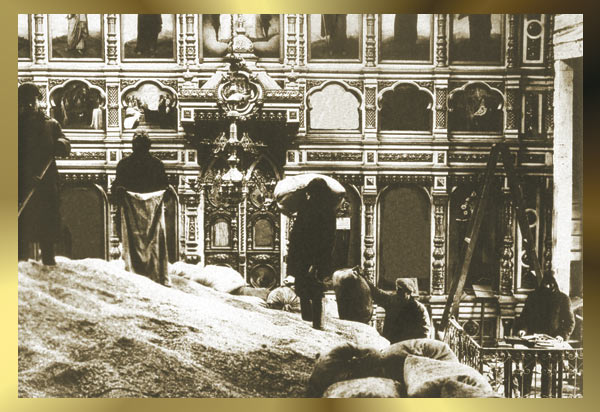 The picture on the above depicts one of the places of worship that was converted into a grain store by the Soviet Union's anti-religious communist regime. |
The Qur'an gives many examples of dictators and regimes that made oppression a matter of policy. One of these regimes was that of Pharaoh and his entourage. Pharaoh openly rejected Musa's (as) call to faith and oppressed the believers. As a result, his violent and oppressive regime did not last, for it was wiped out by a great disaster. The verses relate the events surrounding Pharaoh:
We brought the tribe of Israel across the sea, and Pharaoh and his troops pursued them out of tyranny and enmity. Then, when he was on the point of drowning, he [Pharaoh] said: "I believe that there is no god but Him in Whom the tribe of Israel believe. I am one of the Muslims." "What, now! When previously you rebelled and were one of the corrupters? Today We will preserve your body so that you can be a Sign for people who come after you. Surely, many people are heedless of Our Signs." (Surah Yunus, 90-92)
 Destroyed places of worship provide one of the most obvious proofs for the war on religion. Above left: A destroyed mosque in Bosnia. On the right: A recently destroyed mosque in Macedonia. |
The temporary existence of such oppressive and cruel regimes is part of the trial that Allah creates for believers during their worldly life. In one verse Allah addresses Muhammad (saas) with: "Do not consider Allah to be unaware of what the wrongdoers perpetrate. He is merely deferring them to a Day on which their sight will be transfixed" (Surah Ibrahim, 42), thereby letting him know that the oppressors will meet their punishment. This truth is also revealed in another verse, as follows:
We will test you with a certain amount of fear and hunger, and loss of wealth and life and fruits. But give good news to the steadfast: Those who, when disaster strikes them, say: "We belong to Allah, and to Him we will return." (Surat al-Baqara, 155-156)
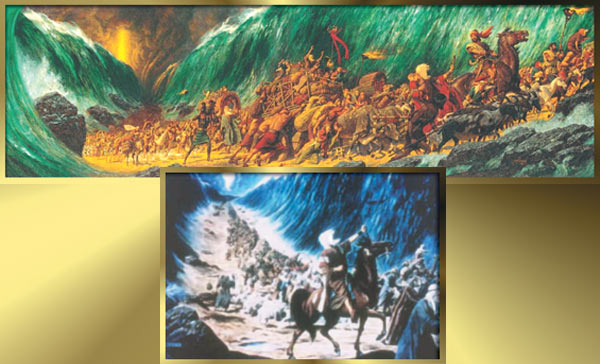 The Pharaoh to whom Musa (as) was sent was known for his cruelty. He oppressed Musa (as) and his nation and tried to force them to abandon their religion. His destiny, determined in eternity by Allah, provides a lesson for all ouf us. He and his army drowned in the sea by the will of Allah. |
Surat al-Kahf 59 also states that such nations were punished because of their wrongdoing. Now, we need to analyze just exactly what this term means. The Qur'an reveals that the wrongdoers are those who ascribe partners to Allah, who deny His verses, and who reject His Messengers. Allah reveals this reality in: "… Only wrongdoers deny Our Signs" (Surat al-Ankabut, 49). Some of the verses on this are:
Those who do not believe say: "We will never believe in this Qur'an, nor in what came before it." If only you could see when the wrongdoers, standing in the presence of their Lord, cast accusations back and forth at one another!.. (Surah Saba', 31)
After he left, Musa's people adopted a calf made from their ornaments, a form which made a lowing sound. Did they not see that it could not speak to them or guide them to any way? They adopted it, and so they were wrongdoers. (Surat al-A`raf, 148)
How can Allah guide a people who have become unbelievers after having faith? They bore witness that the Messenger was true and that the Clear Signs had come to them. Allah does not guide people who are wrongdoers. (Surah Al `Imran, 86)
When you see people engrossed in mocking Our Signs, turn from them until they start to talk of other things. And if Satan should ever cause you to forget, once you remember, do not stay sitting with the wrongdoers. (Surat al-An`am, 68)
As the above verses reveal, the term "wrongdoers" applies to all those who deny Allah's holy Books; who take deities besides Allah; those who, after witnessing the Messengers to be true, return to denial; and those who mock Allah's verses. Allah reveals many more characteristics of such people in the Qur'an. To sum up, "wrongdoing" is defined as all of the actions done by people and nations who reject His values and do not worship as He commands, who grow arrogant toward Allah and His religion, and who deny the Hereafter and the Day of Judgment.
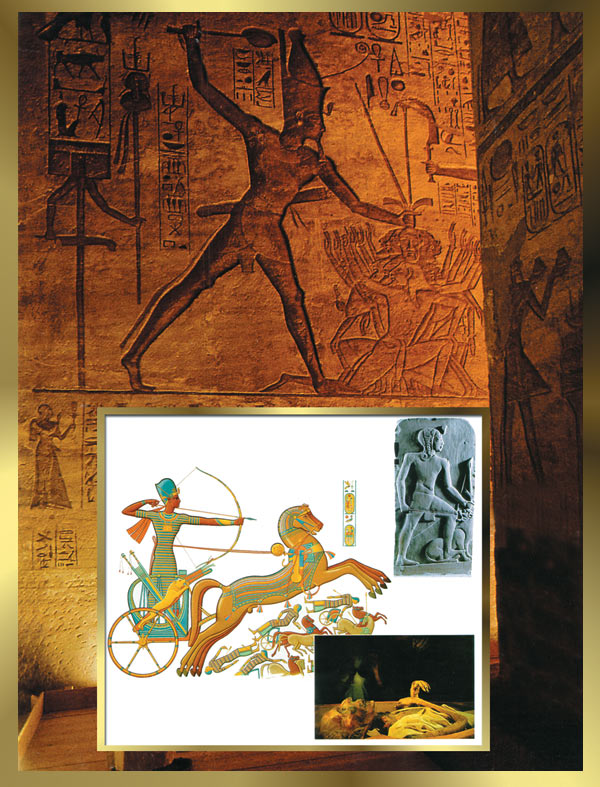 Allah relates Pharaoh's destiny as an example, for he was wicked and claimed godhood. The Qur'an's verses relate in detail what happened to him, and that his corpse would be found so that humanity might learn a lesson. |
It must not be forgotten that the Qur'an reveals that all of those people and nations that deny Allah will be punished severely in both this world and the next. Allah says:
As for those who do not believe, I will punish them with a harsh punishment in this world and the Hereafter. They will have no helpers. (Surah Al `Imran, 56)
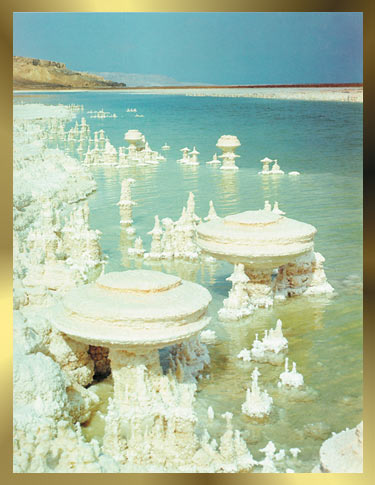 Geçmişte Lut kavminin yaşadığı tahmin edilen Lut gölü ve çevresi. |
This verse reveals that every transgressing nation will be punished in both worlds. Surat al-Kahf calls this time a "promised time." When the appointed time comes, all of the wrongdoers' strength and numbers will be destroyed and wiped out of existence, because this is Allah's law.
In addition, the Qur'an says that if a nation is to be destroyed, there will be an appointment between that nation's Messenger and the angels charged with carrying out this destruction. At this meeting, the angels and the Messenger will clarify the time of the catastrophe destined for that nation. The angels' visit to Prophet Lut (as) is an example of this.
Lut (as) invited his people to belief over a long period of time and advised them to reform and abandon their prohibited lifestyles. But his nation had made the denial of Allah's verses and immorality a way of life, and so continued to reject his calls and persist in their denial. Thus, they deserved the decree of punishment, and the angels informed Lut (as) of his people's imminent destruction. Their visit is related in the following verses:
When Our Messengers came to Lut, he was distressed on their account, feeling incapable of protecting them. They said: "Do not fear and do not grieve. We are going to rescue you and your family—except for your wife; she will be one of those who stay behind. We will bring down on the inhabitants of this city a devastating punishment from Heaven because of their deviance." (Surat al-`Ankabut, 33-34)
When the Messengers came to the family of Lut, he [Lut] said: "You are people we do not know." They said: "We have come to you with that about which they had doubts. We have brought you the truth, and we are certainly truthful men. Travel with your family in the dead of night, following behind with them in front of you. None of you must look back. Go to where you are ordered." (Surat al-Hijr, 61-65)
Thus Allah's angels informed Lut (as) of the catastrophe during their visit and clarified its hour. For Lut's (as) nation, this hour was fixed at dawn:
By your life! They were wandering blindly in their drunkenness! So the Great Blast seized hold of them at the break of day. We turned the place completely upside down, and rained down upon them stones of hard-baked clay. There are certainly Signs in that for the discerning. (Surat al-Hijr, 72-75)
Here, "young" suggests that when doing something, one should seek the assistance of young people and work with them. Young people should be motivated to use their energy, dynamism, strength, ambition, and excitement for right action for Allah's good pleasure. Some of the verses speak of youth, and the following verse states that only some young people of his nation believed in Musa (as):
No one believed in Musa, except [some] offspring [i.e., youths] among his people, out of fear that Pharaoh and the elders would persecute them. Pharaoh was high and mighty in the land. He was one of the profligate. (Surah Yunus, 83)
Surat al-Kahf 60 refers to the meeting point toward which Musa (as) is traveling. Musa (as) knows that he will meet with someone and that this will take place at the "meeting-place of the two seas." This place could be any place on Earth that fits this description.
The term "even if I must press on for many years" indicates that the meeting place was definitely agreed upon, because Musa (as) intends to go to that particular place and not to any other, even if it takes him many years to reach it, for it cannot take place anywhere else. For this reason, Musa (as) will do his best to get there regardless of how long it will take. And, if need be, he will wait there.